| Reviews & Columns |
|
Reviews DVD TV on DVD Blu-ray 4K UHD International DVDs In Theaters Reviews by Studio Video Games Features Collector Series DVDs Easter Egg Database Interviews DVD Talk Radio Feature Articles Columns Anime Talk DVD Savant Horror DVDs The M.O.D. Squad Art House HD Talk Silent DVD
|
DVD Talk Forum |
|
|
| Resources |
|
DVD Price Search Customer Service #'s RCE Info Links |
|
Columns
|
|
|
Good Morning: Criterion Collection
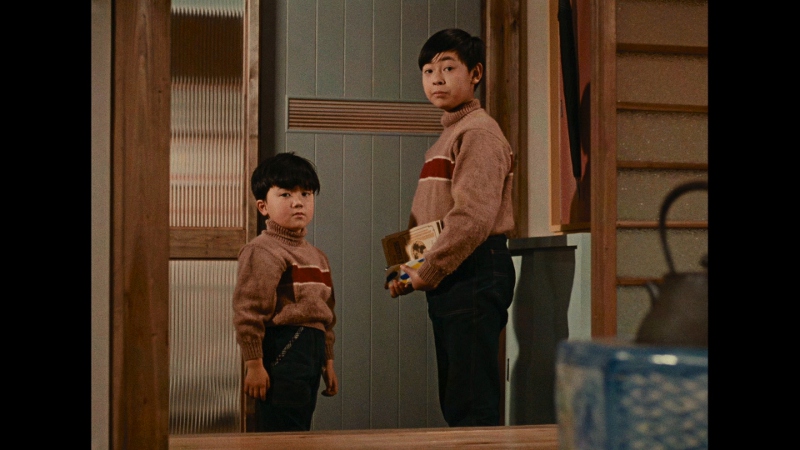 The films of Yasujiro Ozu are rarely broad in scope, usually centering on a handful of ordinary people and their inter-generational conflicts. Even within those narrow boundaries, his 1959 film Good Morning---only Ozu's second of six shot in color before his death four years layer---seems especially insular and lightweight. That's not to say the story isn't worthwhile, of course: it unfolds in a confident manner, bouncing between a handful of interactions that rarely converge but feel so authentic that we get the sense these characters still live in the suburbs of Tokyo. Good Morning also holds the honor of serving up the most fart jokes in Criterion's library, if that floats your boat. Good Morning's most memorable characters are Minoru and Isamu (Shitara Koji and Masahiko Shimazu, seen above), two boys hypnotized by sumo wrestling on their neighbor's brand new television set. Angry with their parents (Ozu regulars Chishu Ryu and Kuniko Miyake) for refusing to buy them one, the boys go on a lengthy silent strike in protest. Meanwhile, their mother has her own conflict with another neighbor, Mrs. Haraguchi (Haruko Sugimura), after their monthly women's club dues turn up missing; especially suspect, since the latter had just purchased an expensive new washing machine. Meanwhile, the boys' English tutor Heiichiro (Keiji Sada) struggles for the courage to ask pretty young Setsuko (Yoshiko Kuga) out on a date, instead choosing to chit-chat about the weather. Simple in execution but subtly layered, Good Morning has very little trouble easing us into its comfortable but often bristly world of suburban life full of gossip, misunderstandings, and growing consumerism. The gags range from subtle to unexpectedly broad, but its recurring focus on human (mis)communication and unwritten rules of social life carry most of the weight. The film's only possible drawback is that its focus takes a fairly long time to tighten; even at just 94 minutes (much shorter than most of Ozu's late-career works), Good Morning doesn't really take a distinct form until the final 30 minutes. Still, it's a comfortable film that holds up to multiple viewings due to the rich color, memorable locales, and committed performances that create a truly authentic and lived-in atmosphere. The 1999 DVD release of Good Morning marked the first Ozu film released by Criterion since the laserdisc era...and aside from a region-free disc by Shochiku in 2014, Criterion's new Blu-ray marks the first domestic upgrade in nearly two decades. It's a fantastic release in every department, easily beating the 1999 DVD with a sparkling new 1080p transfer, lossless audio, and a fine collection of old and new bonus features that even include an "early version" made by Ozu during the silent film era. Not surprisingly, established fans will enjoy it from top to bottom.
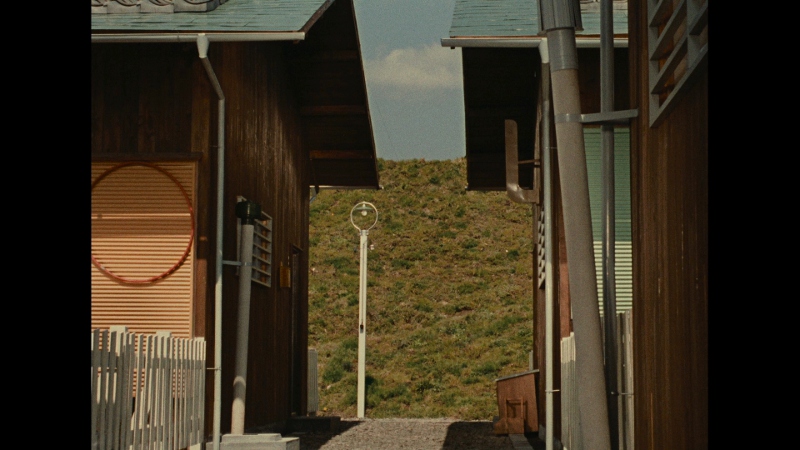
Presented in its original 1.33:1 aspect ratio, Good Morning looks substantially different than Criterion's 1999 DVD, and not just due to the resolution jump and nearly two decades of encoding advances. Sourced from a exclusive new 4K digital restoration, this 1080p transfer serves up a more distinct and consistent color palette, giving the suburban locales a warmer and more lived-in atmosphere; like An Autumn Afternoon, colors are more vibrant with a slight green push and the overall image is also few shades darker with much stronger shadow detail. Textures, film grain, and contrast levels are very pleasing across the board, which enhances the film's effectiveness and lived-in charms. It's simply head-and-shoulders above the previous disc, so die-hard those who have been watching Good Morning on that format for almost 20 years (!) will be amazed at how much better it looks these days.
The uncompressed Japanese PCM 1.0 mono track is perfectly acceptable overall, as neither the dialogue nor Toshiro Mayuzumi's sporadic music cues fight for attention. The dynamic range is obviously a little thin in comparison to newer films, but there are very few technical issues and the studio undoubtedly did what they could to preserve the original audio's modest strengths. Optional English subtitles are included for foreign audio and text translation only.
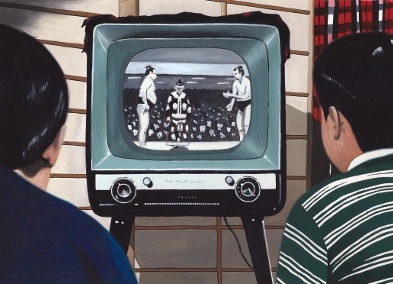 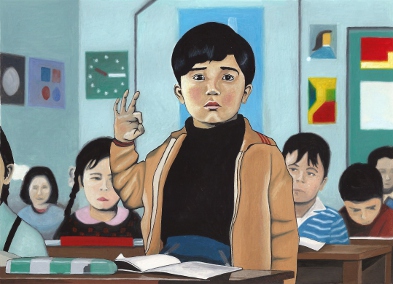 ABOVE: Illustrations by Australian artist Bren Luke.
The remaining two supplements are new retrospective pieces. An Interview with film scholar David Bordwell (18:40), recorded in February of this year, goes into modest detail about Ozu's lengthy film career and a few comparisons and contrasts between Good Morning and the 1932 silent film it was based on. Finally, A new Video Essay by film critic David Cairns (17:32) sheds some light on Ozu's use of humor in his films. Both are well worth watching. As with most Criterion discs, optional English subtitles are included for translation purposes only.
Though rarely listed among Ozu's best films, the charming and enjoyable Good Morning has no shortage of peculiar characters, memorable moments, and makes great use of the director's distinct low-angle compositions. It's also a fine entry point for those new to Ozu films, largely due to its careful use of color and sun-baked suburban landscapes. Criterion's new Blu-ray package offers one of their most substantial upgrades to date, as this disc absolutely tops the 1999 DVD with a sparkling new transfer, lossless audio, and a handful of entertaining and informative bonus features (including an entire second film!). Highly Recommended, especially to owners of the previous disc.
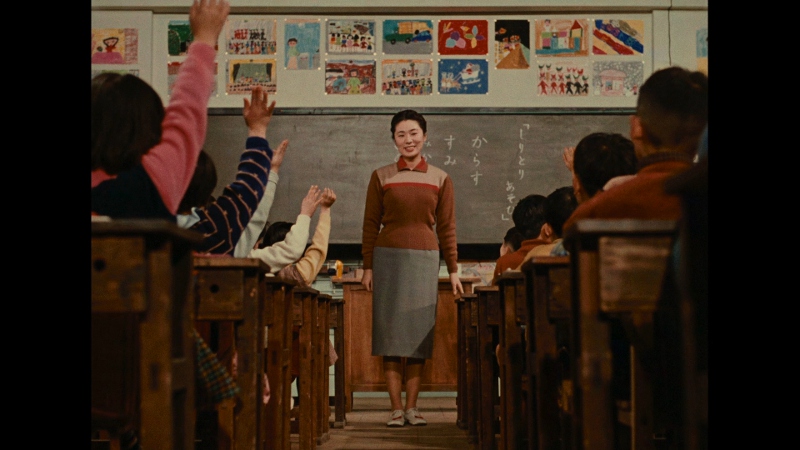 |
|
| Popular Reviews |
| Sponsored Links |
|
|
| Sponsored Links |
|
|
| Release List | Reviews | Shop | Newsletter | Forum | DVD Giveaways | Blu-Ray | Advertise |
|
Copyright 2024 DVDTalk.com All Rights Reserved. Legal Info, Privacy Policy, Terms of Use,
Manage Preferences,
Your Privacy Choices | |||||||












